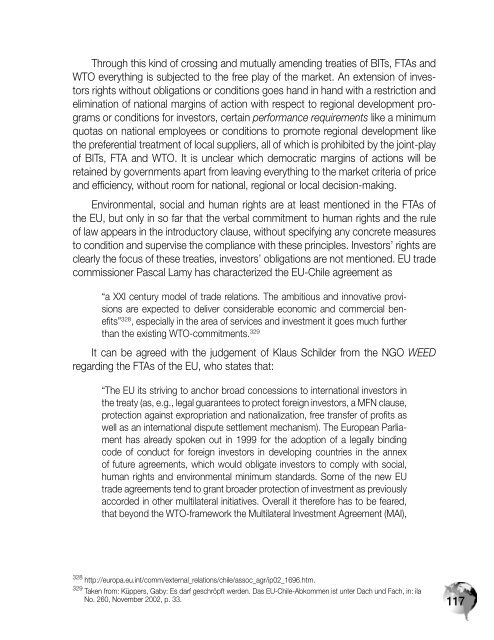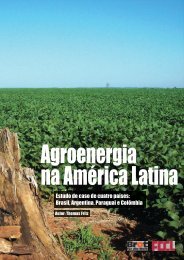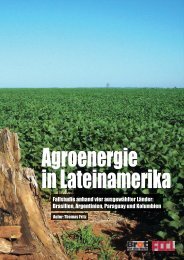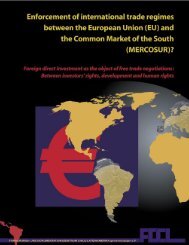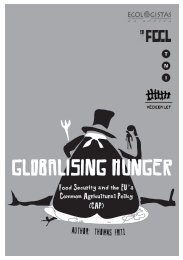Download - FDCL
Download - FDCL
Download - FDCL
You also want an ePaper? Increase the reach of your titles
YUMPU automatically turns print PDFs into web optimized ePapers that Google loves.
Through this kind of crossing and mutually amending treaties of BITs, FTAs and<br />
WTO everything is subjected to the free play of the market. An extension of investors<br />
rights without obligations or conditions goes hand in hand with a restriction and<br />
elimination of national margins of action with respect to regional development programs<br />
or conditions for investors, certain performance requirements like a minimum<br />
quotas on national employees or conditions to promote regional development like<br />
the preferential treatment of local suppliers, all of which is prohibited by the joint-play<br />
of BITs, FTA and WTO. It is unclear which democratic margins of actions will be<br />
retained by governments apart from leaving everything to the market criteria of price<br />
and efficiency, without room for national, regional or local decision-making.<br />
Environmental, social and human rights are at least mentioned in the FTAs of<br />
the EU, but only in so far that the verbal commitment to human rights and the rule<br />
of law appears in the introductory clause, without specifying any concrete measures<br />
to condition and supervise the compliance with these principles. Investors’ rights are<br />
clearly the focus of these treaties, investors’ obligations are not mentioned. EU trade<br />
commissioner Pascal Lamy has characterized the EU-Chile agreement as<br />
“a XXI century model of trade relations. The ambitious and innovative provisions<br />
are expected to deliver considerable economic and commercial benefits”<br />
328 , especially in the area of services and investment it goes much further<br />
than the existing WTO-commitments. 329<br />
It can be agreed with the judgement of Klaus Schilder from the NGO WEED<br />
regarding the FTAs of the EU, who states that:<br />
“The EU its striving to anchor broad concessions to international investors in<br />
the treaty (as, e.g., legal guarantees to protect foreign investors, a MFN clause,<br />
protection against expropriation and nationalization, free transfer of profits as<br />
well as an international dispute settlement mechanism). The European Parliament<br />
has already spoken out in 1999 for the adoption of a legally binding<br />
code of conduct for foreign investors in developing countries in the annex<br />
of future agreements, which would obligate investors to comply with social,<br />
human rights and environmental minimum standards. Some of the new EU<br />
trade agreements tend to grant broader protection of investment as previously<br />
accorded in other multilateral initiatives. Overall it therefore has to be feared,<br />
that beyond the WTO-framework the Multilateral Investment Agreement (MAI),<br />
328 http://europa.eu.int/comm/external_relations/chile/assoc_agr/ip02_1696.htm.<br />
329 Taken from: Küppers, Gaby: Es darf geschröpft werden. Das EU-Chile-Abkommen ist unter Dach und Fach, in: ila<br />
No. 260, November 2002, p. 33.<br />
117


